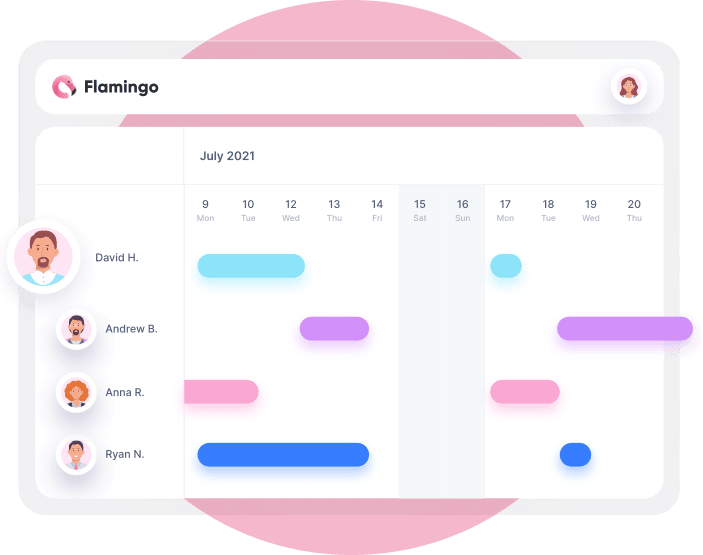
Flamingo is a leave management solution built for modern teams.
No more cluttered spreadsheets and manual data entry. Manage your entire team's leave, directly from Slack, and speed up your leave management workflow.
Learn moreIn this page, we’ll break down all you need to know about leave laws in Croatia.
Read on to learn about employees’ rights in regards to paid time off/annual leave, sick leave, parental leave, national/public holidays, and more.
This page is intended for reference purposes only and does not constitute legal advice. Please see official government sources or consult a legal professional for actual legal advice.
Workers in Croatia are entitled to a minimum of four weeks annual leave each calendar year. For minors and workers in occupations with harmful effects are entitled to five weeks annual leave.
This entitlement is earned after six months of uninterrupted service time.
If annual leave is split into installments, one installment should last at least two weeks continuous duration.
Annual leave should be used in the same calendar year, and cannot be carried over to the following year, unless the worker was prevented from using it, due to situations such as illness or parental leave. In this case, it may carry over until June 30 of the following year at the latest.
Any annual leave that has not been used at the time the employment contract is terminated shall be paid out to the employee.
Learn more about Use It or Lose It policies here.
Workers in Croatia are entitled to paid sick leave.
Their employer covers the first 42 days of sick leave (seven days for workers with disabilities), providing compensation of at least 70% of the worker’s regular pay.
After this time, the employee can claim a sickness benefit from the Croatian Health Insurance Fund (HZZO), assuming they have met a minimum contribution threshold. The sickness benefit provides compensation of 70% of the worker’s regular pay, with a minimum EUR 111 and a maximum EUR 566.
Croatia has 13 public holidays:
| Date | Holiday |
|---|---|
| January 1 | New Year’s Day |
| January 6 | Epiphany |
| March/April (varies) | Easter Sunday |
| March/April (varies) | Easter Monday |
| May 1 | International Workers’ Day |
| 60 days after Easter | Corpus Christi |
| May 30 | National Day |
| June 22 | Anti-Fascist Struggle Day |
| August 5 | Victory and Homeland Thanksgiving Day and the Day of Croatian defenders |
| August 15 | Assumption Day |
| November 1 | All Saints’ Day |
| November 18 | Remembrance Day |
| December 25 | Christmas Day |
| December 26 | St.Stephen’s Day |
Public holidays are provided as a paid day off, and if required to work on a public holiday, workers are entitled to extra compensation.
Workers are entitled to 28 days of maternity leave prior to birth (rising to 45 if there are complications), plus 70 days that can be used after birth (up until the child turns six months old).
The mother can also claim additional maternity leave, up until the child is six months old. The mother can also choose to waive this leave, or transfer it to the father (in full or part).
Fathers are entitled to paternity leave totaling 10 working days for one child, or 15 working days for multiple births.
Maternity leave and paternity leave are covered by the HZZO at 100% of the worker’s regular pay, assuming they meet the required threshold for contributions.
Adoptive parents are entitled to adoption leave during the first six months of the child’s life, paid in the same way as maternity leave.
Employees are entitled to take parental leave, starting six months after birth up until the child turns eight years old. Both parents are entitled to parental leave, and can take up to four months for their first and second child, and up to 15 months for twins and for their third (and each subsequent) child.
All but two months of parental leave can be transferred from one parent to the other. If only one parent is taking parental leave, they are entitled to a maximum of six months for the first and second child, and 28 months for twins/third/subsequent children.
Parental leave is paid by the HZZO. For the first six or eight months, this is 100% of the worker’s regular pay (maximum EUR 995,44), and EUR 551,80 for the remainder.
Employees are entitled to seven days off per year (paid by their employer) for certain life events, including the serious illness or funeral of a family member.
What is Bereavement Leave? Click here to learn more.
As mentioned above certain situations entitle the employee to paid leave (totaling seven working days per year), including:
https://uznr.mrms.hr/wp-content/uploads/labour-act.pdf
https://ec.europa.eu/social/main.jsp?catId=1104&intPageId=4454&langId=en

No more cluttered spreadsheets and manual data entry. Manage your entire team's leave, directly from Slack, and speed up your leave management workflow.
Learn more